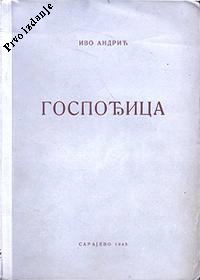Review
 This novel by Andrić was originally published in Serbian in 1945 and is one of the treee novels that make up the "Bosnian Trilogy". The other two are "Bosnian Chronicle" and "The Bridge on the Drina".
This novel by Andrić was originally published in Serbian in 1945 and is one of the treee novels that make up the "Bosnian Trilogy". The other two are "Bosnian Chronicle" and "The Bridge on the Drina".
The novel is set in the cities of Sarajevo and Belgrade dyring the first three decades of this century. The places and time are not incidentally chosen. Ivo Andrić is from Bosnia and knows the people and their problems in this unique area. The theme and composition suggest a work of modern classicism. It is the tragic life of a woman disappointed in people and in the world she lives in. She is completely enslaved by money, in which she hopes to find security and revenge in a hateful and insecure world. At the same time she is literally and feverishly following her bankrupt father’s last plea, as she becomes not only thrifty but a real miser in a classical Gogolian style.
This novel is dominated by a single character, a spinster named Miss Raika Radaković who is dominated by a single passion, stinginess. The development of this passion is traced through the first third of this century, from the time Miss Raika’s dying father, a ruined merchant, solemnly enjoins his school-girl-daughter to guard with her life the little property he can leave herThe first page of the novel The Woman from Sarajevo, until some thirty-five years later when she herself dies, a scrawny old woman, unloved and unlovable, but faithful to her trust. As a moneylender she parlays small insurance legacy after her father into a small fortune. But whatever her wealth at any time, she will spend none of it on herself. For this single-minded greed for money she puts everything else out of her life – love, friendship, concern for other people.
Raika also speculates in currencies during the tumultuous years of the Austro-Hungarian Empire and the uncertain emergence of the new Yugoslav state. A good deal of the power of Andrić’s tale comes through the depiction of this seething historical background, in whose torrent the wretched Raika’s life is washed along like a piece of flotsam.
 The novel is carefully thought out and fully imagined, with solid passages of description in the nineteenth-century manner and scrupulous attentions to the job of relating the individual life to the broader pattern of social and economical change With brilliant economy Andrić sketches the stages through which Miss Raika hoards and increases her inheritance: Sarajevo in the era of provincial usury, the economic upheavals and disintegration of the First World War, staid Belgrade headily embarking on the jazz age when the war is over, the pinched depression years during which Miss Raika dies. The requisite drama – the testing of the ruling passion – is present in the form of a young man whose physical resemblance to a beloved uncle long dead touches Miss Raika’s heart enough to make her swerve, though only momentarily, from her objective of never parting with her money.
The novel is carefully thought out and fully imagined, with solid passages of description in the nineteenth-century manner and scrupulous attentions to the job of relating the individual life to the broader pattern of social and economical change With brilliant economy Andrić sketches the stages through which Miss Raika hoards and increases her inheritance: Sarajevo in the era of provincial usury, the economic upheavals and disintegration of the First World War, staid Belgrade headily embarking on the jazz age when the war is over, the pinched depression years during which Miss Raika dies. The requisite drama – the testing of the ruling passion – is present in the form of a young man whose physical resemblance to a beloved uncle long dead touches Miss Raika’s heart enough to make her swerve, though only momentarily, from her objective of never parting with her money.
The chronicle is Andrić’s favorite form, and this novel is no exception, a highly poetic form depicting the past and the present in a meticulous artistic and philosophical manner. Detailed historical analysis serves as a “chain” and always gives a basis for philosophical interpretation.
Fragment
I Chapter
(...)
In this joyless room Miss Raika spends most of her time, for it is the only part of the house that is heated. Here she sleeps and passes the day, here she works, and here, on the small stove, she cooks her frugal lunch which is also her supper. She doesn't spend much time on chores such as tidying up or cooking. Above all, she dislikes spending money; the very word - spending- in any shape or connection, fills her with repugnance. A different thing altogether is the work she is doing at the moment - mending. This is pleasant, useful work: it uses up much time and strains the eyes, it is true, but it helps to save all the rest; for time and eyes are things one has an abundance of, which can hardly be said of "all the rest." A stitch in time saves nine, she tells herself as she sits down by the window. Then, picking up her old stockings which have been mending several times, she repeats the saying over and over again in her mind - a stitch in time...! - just as young girls at work feel impelled to hum the words and melody of a love song which, though meaningless in itself and picked up God knows where and how, nevertheless provides a vivid picture and an exact expression of their own deepest longings.
Mending! What a delight that is! True, it is an endless and wearying struggle to outwit a powerful unseen enemy. In this struggle there are many dull, trying, and seemingly frustrating moments: defeat and faintheartedness are not infrequent; but there are also, more numerous by far, bright moments of devoted, holy service and victorious elation. It happens sometimes that a pair of old slippers or a piece of underwear becomes threadbare or torn at some spot or other, so that the whole thing is rendered useless, fit neither to be worn nor to be thrown out. And here, where any other woman might throw up her hands and give in to the irresistible power that frays and wears away all possessions, and dogs every human life and every moment, like the curse hurled down on human existence because of man's original sin, here, as far as Miss Raika is concerned, is where the real struggle only just begins, where the prospect of victory begins to open up, arduous and remote but potentially rewarding. With her quiet and invisible, her great and obstinate virgin's strength, she pounces on this object and will not let it out of her hands and sight until it is mended and patched for another long spell of wear.
"Every other woman in my place would have thrown this away, but I throw nothing away." This is how Miss Raika talks to herself as she gazes, with a kind of loving elation, at the slipper that has been saved and snatched from the jaws of that hostile power which gnaws, bores, eats away, and tears everything that people wear or touch. True, the slipper is no longer pleasing to the eye and his in fact shrunk and lost its shape, so that it is bound to pinch and scratch and make sores on the skin of the foot. Still, what is all that compared to the satisfaction she gets from such a victory over waste. Let it rub and draw blood, the discomfort is all the sweeter. She is willing to put up with much more than that.
As for beauty, she could not care less. Beauty is an expensive thing - madly expensive, yet worthless and deceptive. There is no greater prodigal, no greater mirage than beauty. Miss Raika never cared for it, she always shied away from it, and her experience so far has only confirmed her in this attitude. She never could quite understand why people make such a distinction between something that is beautiful and something that is not, and what it is that enthuses and enraptures them to a point where what they call beauty causes them to lose their health and spend their money, sacred and mighty Money that is above all things and against which no beauty of any kind can ever be adequately measured. And now that she is getting on in years, now that the vast and unimagined loveliness and joy of thrift grows more apparent and clearer to her, she is beginning to feel a stronger and more decisive hatred for Beauty - that heresy, as it were, which is like an evil heathen idol that leads people into lamentable ways and turns their faces from the one and only true deity, thrift. "A stitch in time" - this is the silent, fitting way to worship the deity. Stitching and darning means fighting against decay, means helping eternity perpetuate itself. That is why her petty and humble chore is actually holy and momentous, why it fills her soul with peace and contentment. It is something worth slaving over, it justifies all kinds of hardships and sufferings.
"Drudgery!" This, too, is a form of delight. She knows it very well, for she has endured many things in her life for its sake, and has got much satisfaction out of it. And why shouldn't a person suffer here and there when he knows that by virtue of it he is sparing himself much greater evil and paying for something infinitely more worthwhile? Man would not be a rational being if he could not see that this course is advantageous and safe. When all is said and done, how can we compare our small inconveniences and self-denials in the service of thrift with all that thrift gives us and all it can save us from? Thrift preserves life and stability around us, it constantly makes us richer and perpetuates, so to speak, what we already have; it protects us from expenses, losses, and chaos, from penury, from the misery that lies in wait for us at the end, which is darker and more infamous than death itself, indeed a true hell while we are still alive here on earth. If a person only remembered how everything around him steadily and imperceptibly dwindles and wanes, breaks, shrinks, and fritters away, how puny and ineffectual are measures he can and does take in his struggle against it, he would willingly accept every hardship and privation only to ward off this evil, and he would feel ashamed for every moment of rest and inaction, and for every morsel of food he eats and for spending unwisely and indulging in luxuries. In this unequal fight, one must endure everything with the fanatical courage of a martyr.
Lost in these reveries, Miss Raika feels a chill coming on. She sticks her needle into the stocking and, feeling stiff and heavy all over, gets up and goes to the stove to look at the fire. It is a fire in name only; actually it is no more than a feeble little flame that can barely ever warm up the room, and yet Miss Raika seems to feel it is a flame that consumes wood and coal like Mt. Vesuvius and Mt. Etna combined, or like that American volcano whose name she can no longer remember but whose flame is known to devour and burn up more than all of the European volcanoes put together. She is about to toss in a few lumps of coal, but flinches back at the same instant, almost as if she were on the verge of committing a great and irreparable sin, then grits her teeth and resolutely goes back to her seat. Here she continues to darn her stockings. She is pleased with herself and content with the world, in which evidently there is always room and always another opportunity for extra thrift. (she remembers having read in a newspaper at one time that the regulation temperature in the military barracks during the winter moths is fifty-eight degrees Fahrenheit.) Thinking about it she feels the cold much less. She is warmed by the thought of the shovelful of coal she had denied herself. At the same time, her hands are blue from cold, her lips gray, her nose red. Now and then her whole body is racked by a deep inner shudder of cold. And yet Miss Raika refuses to give in and does not leave her chair. She is like one of those trained and seasoned soldiers who can't help a brief shiver in moments of danger, but manage to overcome it and march forward undaunted.
And so Miss Raika goes on mending and suffering but does not surrender or complain. Cramped and stiff with cold, she darns the threadbare spot on the stockings, carefully weaving the cotton through the yarn filaments that have slackened and pulled apart, looping the needle under one thread and skipping the next, securing one and omitting the other, back and forth, one after another, until at last the worn patch is mended and secured.
And afterwards, as she looks at it, her whole being expands in the knowledge that one more housekeeping item has been set down in the asset column of her consolidated balance sheet of losses and gains. And even more: that in the formidable and unceasing battle against waste, spillage, and costs, another victory has been won against odds, that on the great galleon of the universe, constantly threatened from every quarter, one more insidious leak has been plugged up. Frequently, in her moments of happiness, that knowledge swells to a sense of victorious exhilaration.
Then it is time for another hole, on the same stocking or perhaps a different one. And each one seems hopeless and beyond repair at the outset. Yet, each, in the end, yields to victory. Hour after hour goes by in the seemingly monotonous and dreary task. But the monotony is deceptive. For as she guides her needle and thread through the wrap and woof of the stocking, Miss Raika lets her mind wander between daydreams and memories, dwelling now on one, now on the other, from stitch to stitch, from memory to memory, as if the needle were rethreading the whole fabric of her life.
(...)